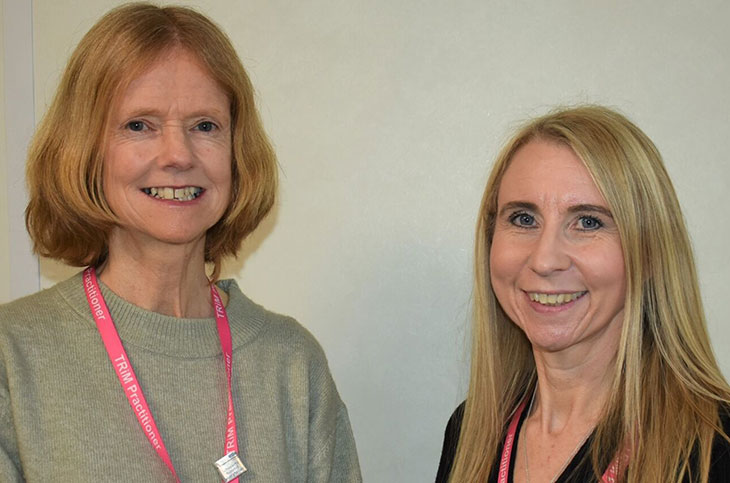
The trauma risk management (TRiM) framework is a means of supporting staff after a potentially traumatic experience (PTE) or accumulation of experiences, and to identify symptoms of stress early. We talked to Kati Tewkesbury, TRiM Lead (pictured above right), and Kim Boorman, TRiM Lead and Schwartz Round Co-Ordinator (pictured above left), to find out more.
“The mental health of our staff is important to me as I see it as a vital part of the way we care about each other, especially after the impact of the pandemic,” says Kati. “For staff to be able to give the best care, they must first be on top form themselves.”
TRiM originated in the military as an assessment tool to help people after a potentially traumatic experience to try to prevent long-term poor mental health, or post-traumatic stress disorder (PTSD). TRiM is a psychologically safe framework and can be offered to anyone at the trust who feel they may benefit.
“I’m passionate about staff support, as working in the NHS can be very stressful, as well as very rewarding,” says Kim. “We cannot prevent staff from being exposed to potentially traumatic experiences, but I feel we have a duty to support them following such experiences.”
The first cohort of TRiM practitioner training began at the beginning of 2021. Since then, four more cohorts of staff have undertaken their TRiM practitioner training, enabling them to support staff following a potentially traumatic experience.
“TRiM offers support in a structured, confidential, evidence-based framework,” continues Kim. “It gives the staff member an opportunity to talk about and process what has happened and enables them to be signposted or referred for further support, such as trauma therapy, if required.”
Following a potentially traumatic experience, a referral for support can be made by a manager, a person in charge or staff can self-refer. TRiM can be offered individually or to a small group of people who have been part of the same experience. The assessment is usually carried out within three to seven days and will be followed up a month later.
“We are good at giving great care but not always good at self-care,” says Kati. “Traumatic events are more likely to happen in healthcare, but that does not mean it’s acceptable to expect staff to just carry on afterwards.
“TRiM intervention is a great supportive net to catch staff before they fall and provide them with the correct support and help they need to carry on in the profession they have chosen to be in.”
